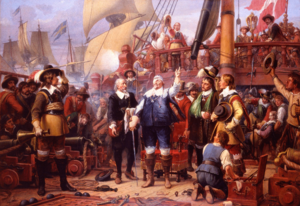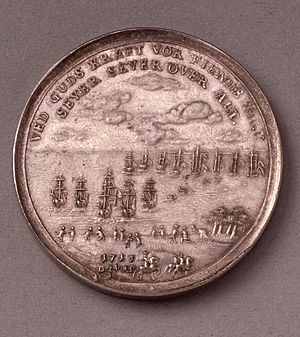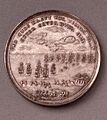Battle of Colberger Heide facts for kids
Quick facts for kids Battle of Colberger Heide |
|||||||
|---|---|---|---|---|---|---|---|
| Part of the Torstenson War | |||||||
 Battle of Kolberg Heath, Wilhelm Marstrand |
|||||||
|
|||||||
| Belligerents | |||||||
| Commanders and leaders | |||||||
| Strength | |||||||
| 40 warships | 34 warships | ||||||
| Casualties and losses | |||||||
| 207 killed and wounded | 101 killed and wounded | ||||||
The Battle of Colberger Heide was an important naval battle. It took place on July 1, 1644. This battle was part of a bigger conflict called the Torstenson War. It happened in the sea near the coast of Schleswig-Holstein.
The battle ended without a clear winner. However, the Dano-Norwegian fleet had a small success. Their fleet was led by Jørgen Vind and King Christian IV. They fought against a Swedish fleet. The Swedish fleet was led by Klas Fleming.
Contents
The Battle Begins: Ships and Strategy
This naval battle involved many ships and cannons. The Dano-Norwegian fleet had 40 warships. These ships carried about 927 cannons. The Swedish fleet was a bit smaller. It had 34 warships and 7 special fireships. The Swedish ships had more cannons, about 1018 in total.
How the Fleets Moved
The Dano-Norwegian fleet came from the east. The Swedish fleet approached from the west. They met just north of the island of Fehmarn. The Swedish ships then turned south. They sailed along the west side of Fehmarn. They stayed close to the shore, near a shallow area.
The Danish ships followed them. They stayed a little further out in the deeper water. The Swedish fleet then turned north. They swung around and started sailing west again. The Danish ships continued to sail alongside them.
As the battle went on, both fleets changed direction. They turned with the wind, sailing north. Then they turned back east, moving south of the island of Langeland. When they got close to the island of Lolland, the Swedish ships turned south. They eventually ended up in Kiel Bay. The Danish ships kept going southeast. They dropped anchor to the east of Fehmarn.
Who Was Hurt: Casualties of the Battle
In this battle, no ships were lost by either side. But many sailors were injured or killed. The Dano-Norwegian side had 37 sailors killed. Another 170 sailors were wounded. Among the Dano-Norwegian wounded was their commander, Jørgen Vind. He sadly died from his injuries soon after the battle.
The King's Injury
King Christian IV of Denmark was also hurt during the battle. He was wounded and lost an eye. Despite his injury, the king showed great bravery. This made him a hero to his people.
Why This Battle Was Important
After the battle, the Dano-Norwegian fleet managed to trap the Swedish fleet. They held them in the Bay of Kiel. This was a small victory for Denmark-Norway. However, this battle was not the final decider of the war. Later, the Dano-Norwegian navy faced a big defeat. This happened in another battle off the Fehmarn coast.
A Lasting Memory
The Battle of Colberger Heide is still important today. Many people see it as the last time Denmark-Norway won a major naval battle against Sweden. These two countries fought for a long time. They wanted to control the Baltic Sea.
The battle also became famous because of King Christian IV's bravery. He showed great personal courage during the fight. This moment was captured in a famous painting by Vilhelm Marstrand. It is also remembered in the first lines of Denmark's royal anthem. The anthem is called Kong Christian stod ved højen mast.
Images for kids
 | Stephanie Wilson |
 | Charles Bolden |
 | Ronald McNair |
 | Frederick D. Gregory |



